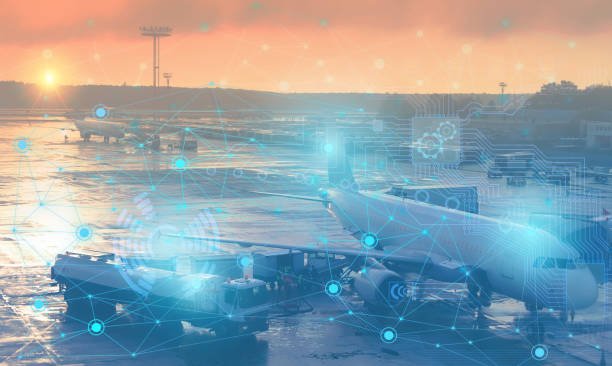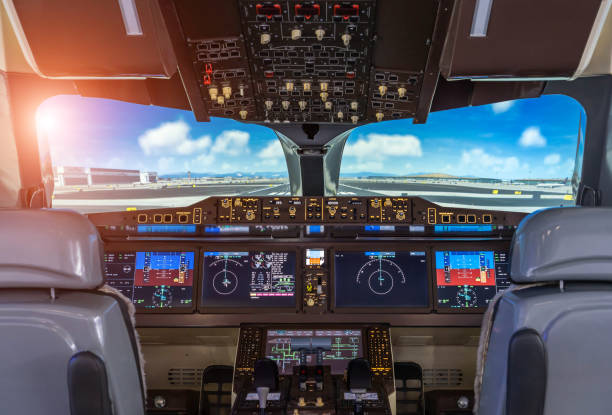Prologue to the Aerospace Artificial Intelligence Business Sector
The aviation computerized reasoning business sector has everlastingly been at the cutting edge of mechanical advancement. From Wright Kin’s most vital excursion to the improvement of supersonic planes, the excursion for efficiency, security, and examination has driven degrees of progress around here. Of late, one more player has emerged in the flying field: electronic thinking (man-made knowledge). Man-made knowledge is changing flight-related exchange in huge ways, from updating security to improving exercises. In this article, we will dive into the flight-man-made thinking business area, examining its continuous scene, reasonable applications, challenges, and the promising future it holds.

The Continuous Scene of the Aerospace Artificial Intelligence Business Sector
The aviation computerized reasoning business sector has experienced huge improvement and is still up in the air due to a couple of factors:
Wellbeing Improvement: The Aerospace Artificial Intelligence
Prosperity is the principal in flight, and mimicked knowledge is expecting a critical job in additional creating it. Man-made intelligence estimations can inspect tremendous amounts of data to perceive potential security issues and make progressing plans. For instance, farsighted people constrained by reproduced knowledge can perceive quirks in plane parts, hindering extreme breakdowns and setbacks.
Functional Capability: The Aerospace Artificial Intelligence
Transporters and flight associations are under pressure to smooth out their exercises. Man-made brainpower streamlines various cycles, for instance, flight booking, cooperation among leaders, and fuel usage. These progressions save costs as well as reduce the regular impression of the business.
Independent Systems: The Aerospace Artificial Intelligence
Mimicked insight is a key engaging impact of free-flight structures. Computerized flying vehicles (UAVs), generally called drones, rely upon recreated insight for course, obstruction revulsion, and, shockingly, free routes. The strategic region has explicitly embraced PC-based, insight-powered drones for perception and reconnaissance.
Space Examination: The Aerospace Artificial Intelligence
Recreated knowledge accepts an earnest job in a space examination. It helps with mission planning, free courses, and the examination of enormous amounts of data accumulated from space missions. For example, NASA’s Mars drifters utilize man-made knowledge estimations to come to conclusions about their exercises, considering the data they gather.
Air Traffic The leaders:
Air traffic should increase, in a general sense, in a little while. Man-made reasoning can help with managing this blockage by improving air traffic courses, diminishing deferrals, and chipping away at the overall capability of the airspace.
Utilizations of Aerospace Artificial Intelligence Business Sector
We ought to explore some of the specific purposes of the aerospace artificial intelligence brainpower market.
- Predictive upkeep:
Reproduced knowledge computations separate data from sensors on planes to anticipate when parts could crash and burn. This enables advantageous upkeep, diminishes individual time, and perhaps avoids awful disillusionments.
- Flight test frameworks:
Man-made reasoning-driven pilot test programs give reasonable arrangements to pilots, helping them prepare for various conditions, including emergencies.
- Crew and Explorer Prosperity:
PC-based knowledge can evaluate explorers and their groups for signs of agony or unusual approaches to acting and overhauling security during flights.
- Weather Direction:
Exact environmental data is essential for safe flight. Man-made knowledge further creates weather condition-determining models, giving more careful information for flight arrangements.
- Navigation and Autonomy:
Free planes and robots rely on computerized reasoning for course, catch avoidance, and route. This advancement has applications in both military and civilian regions.
- Space Examination:
PC-based knowledge helps with mission organizing, free course determination, and data assessment in space examination missions. It can also help the mission for extraterrestrial life by analyzing data from telescopes and drifters.
Troubles and concerns
While the man-made intellectual prowess market holds extraordinary responsibility, it also faces a couple of troubles and concerns:
- Safety Concerns:
The introduction of PC-based knowledge in flight raises issues about the security and steadfastness of these systems. Ensuring that PC-based knowledge-driven developments are protected areas of strength from computerized risks is critical.
- Regulatory Hindrances:
The aerospace artificial intelligence brainpower market is strongly coordinated, and integrating computerized reasoning into plane and airspace systems requires investigating complex, authoritative designs.
- Data Assurance:
Reenacted knowledge structures in flying accumulate and cycle gigantic measures of data, including voyager information. Ensuring the insurance and security of this data is a tremendous concern.
- Ethical Considerations:
Free structures and man-made reasoning-driven elements raise moral issues, particularly in military applications. Ensuring that man-made knowledge is used constantly and ethically is an essential test.
- Cost of Execution:
Completing mimicked insight structures for plane and flight assignments can be expensive. Associations ought to check the normal benefits against the frank costs.
The Promising Destiny of the Aviation Computerized Reasoning Business Sector
No matter what these hardships, the avionics man-made mental ability market is prepared for the basic turn of events. The improvement of PC-based knowledge estimations, along with progress in hardware, will drive headway in the business. The following are a couple of basic examples and future prospects:
- Advanced Freedom:
The improvement of astoundingly autonomous planes and robots will keep opening up extra doors for cargo movement, perception, and even explorer transport.
- AI-Energized Cockpits:
Cockpit structures will end up being dynamically PC-based and insight-driven, giving pilots progressing data assessment and decision-making help.
- Space Examination:
Man-made reasoning will expect a critical job in future space examination missions, including upkeep missions to Mars and the journey for extraterrestrial life.
- Reduced Normal Impact:
PC-based insight-driven improvement of plane exercises will contribute to diminishing the carbon impression of the flight-related exchange.
- Humans put forth insight. Facilitated attempt:
The inevitable destiny of flying will likely incorporate close participation among individuals and man-made insight systems, with computerized reasoning aiding and extending human autonomous bearing.
Ends: Aerospace Artificial Intelligence Business sector
The flying man-made intellectual prowess market tends to be a striking blending of cutting-edge development and a strong industry. Man-made knowledge is currently committed to somewhere safe and secure, efficiency, and examination in avionics. As computerized reasoning advancement continues to advance and beat troubles, we can expect to see significantly additional earth-shattering applications later on.
Nevertheless, it is influential to push toward this change with sharpness, considering prosperity, ethics, and managerial concerns. The aeronautics business ought to figure out a concordance between embracing progression of some sort or another and ensuring the best assumptions for prosperity and security.
All things considered, the flying modernized thinking business area is taking off higher than at any time in recent memory, opening a vast expanse of chances for flight and space examination, to say the very least. As man-made brainpower takes off, it commits to changing how we travel, research the skies, and attempt the unimaginable.

FAQs about the Aerospace Artificial Intelligence Business sector
What is the aerospace artificial intelligence brainpower market?
The Aerospace Artificial Intelligence Brainpower Market implies the use of automated thinking (reenacted knowledge) and computer-based intelligence (ML) progressions in the aerodynamic exchange. It incorporates using man-made consciousness computations to look at data, just choose, and overhaul various pieces of flight, space examination, and related fields.
How does PC-based knowledge further foster security in flying?
Computerized reasoning further develops prosperity through judicious help, constant data assessment, and noticing structures. For example, man-made reasoning can expect plane part frustrations, recognize abnormalities in in-flight data, and screen voyagers and gatherings for signs of agony or astonishing approaches to acting, adding to their general prosperity.
What are a couple of applications of PC-based knowledge in flight?
Recreated knowledge has different applications in flying, including farsighted upkeep, autonomous flight systems, pilot preparation programs, weather pattern measuring, course arranging, and space examination, and that is just a glimpse of something larger. It can smooth out exercises, decrease costs, and further foster capability in various flying regions.
Are there any regulatory hardships connected with computerized reasoning in flight?
Without a doubt, coordinating PC-based insight into flying exercises faces managerial troubles. The aeronautics business is strongly developed, and reenacting insight structures requires consistency with prosperity and security standards. Associations ought to investigate complex regulatory frameworks to ensure safe PC-based insight blends.

Well explained vro 🩷💫
👍NYC Bhai 👍